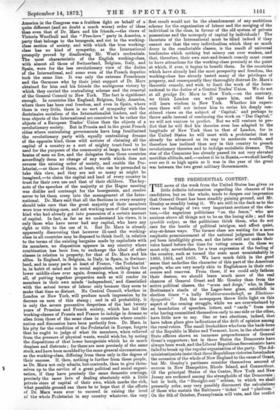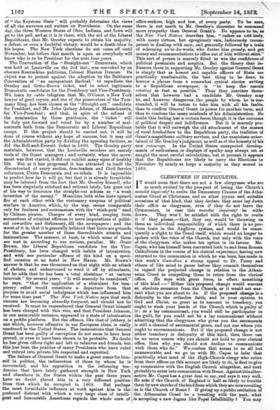THE PRESIDENTIAL CONTEST.
THE news of the week from the United States has given us little definite information regarding the chances of the candidates, but on the whole, tends to deepen our impression that General Grant has been steadily gaining ground, and Mr. Greeley as steadily losing it. We are still in the dark as to the views or feelings of two very important sections of the elec- tors,—the sagacious politicians "on the fence," who are anxious above all things not to be on the losing side ; and the ignobile vulgu,s, as the politicians think them, who do not care for the bustle of political intrigue, and affect quiet, stay-at-home ways. The former class are waiting for a more emphatic pronouncement of the national judgment than has yet been intelligibly given, and the latter will not make their voice heard before the time for voting comes. On these we must rely, nevertheless, for a true expression of the feeling of the country, such as turned the scale most unmistakably in 1860, 1864, and 1868. We have much faith in the good sense that underlies the character of this part of the American people, who are very nearly akin to Englishmen in their reti- cences and reserves. From these, if we could only fathom their desires, we should learn much more of the real chances of General Grant and Mr. Greeley than from the active political classes, the "scum and dregs," who, in Hans Breitmann's simile of the Lager-beer glass, establish in election times " a bully Wablverwandschafi, or Elections- Sympathie." But the newspapers throw little light on this aspect of the coming struggle, while we are overwhelmed by an inundation of speeches, letters, and " cards " from men who having committed themselves early to one side or the other, have little new to say. One or two elections, indeed, that have taken place give indications of the drift of opinion among the rural voters. The small freeholders who form the back-bone of the Republic in Maine and Vermont, have, in the elections of State officers shown an immense preponderance of General Grant's supporters ; but in these States the Democrats have always been weak, and the Liberal Republican Secessionists have failed to break up the regular organisation of the party. The Ad- ministrationists insist that these Republican victories foreshadow the accession of the whole of New England to the cause of Grant, but Mr. Greeley's partisans consider themselves assured of success in New Hampshire, Rhode Island, and Connecticut. Of the principal States of the Centre, New York and New Jersey are reckoned among the strongholds of the Democrats ; but in both, the " Straight-out " schism, to which we shall presently refer, may very possibly disconcert the calculations of those who sustain the Baltimore " ticket " and "platform." On the 8th of October, Pennsylvania will vote, and the verdict
of "the Keystone State" will probably determine the views of all the waverers and waiters on Providence. On the same day, the three Western States of Ohio, Indiana, and Iowa will go to the poll, and as it is in these, with the aid of the Liberal Republicans, that Mr. Greeley expects to obtain his majority, a defeat, or even a doubtful victory, would be a death-blow to his hopes. The New York elections do not come off until November, but before that month is upon us everybody will know who is to be President for the next four years.
The Convention of the " Straight-out " Democrats, which was held at Louisville on the 3rd inst., was convoked by an obscure Kentuckian politician, Colonel Blanton Duncan. Its object was to protest against the adoption by the Baltimore Convention of "an unrepentant Radical," to repudiate the Greeley and Gratz-Brown ticket, and to select legitimate Democratic candidates for the Presidency and Vice-Presidency. We learn by cable telegram that Mr. O'Conor, a New York lawyer of good repute, and one of the prosecutors of the Tam- many Ring, has been chosen as the " Straight-out " candidate for President, and Mr. John Quincy Adams, of Massachusetts, for Vice-President ; and that, in spite of the refusal of the nomination by those gentlemen, the " ticket" will be duly put forward and voted for by a number of mal- contents both from the Democratic and Liberal Republican camps. If this project should be carried out, it will be done of course without any hope of success, but it may aid the Administration party by dividing the opposing factions, as did the Bell-and-Everett ticket in 1860. The Greeley party maintain, however, that the Louisville seceders are merely tools of the Grant managers ; and certainly, when the move- ment was first started, it did not exhibit many signs of healthy life. But as it has progressed it has attracted to itself the discontented of every section, free-traders and Civil Service reformers, Union Democrats and ex-rebels. It is impossible to predict how far it will go, but that it is already formidable may be inferred from the fact that Mr. Greeley himself, who has been singularly subdued and reticent lately, has gone out of his way to denounce the straight-out schism as "a weak invention of the enemy." Meantime both sides have opened fire at each other with the customary weapons of political warfare in America, which, by the way, seems comparable only for foulness and noisomeness with the " stink-pots" used by Chinese pirates. Charges of every kind, ranging from accusations of criminal offences to mere imputations of politi- cal cowardice and dishonesty, fill the newspapers ; and the worst of it is, that it is generally believed that there are grounds for the greater number of these discreditable attacks and insinuations. The manner, at least, in which some of them are met is, according to our notions, peculiar. Mr. Gratz Brown, the Liberal Republican candidate for the Vice- Presidency, has been charged with habits of intoxication, and with one particular offence of the kind on a speci- fied occasion at an hotel in New Haven. Mr. Brown's answer is that he was threatened on that night with an attack of cholera, and endeavoured to ward it off by stimulants, but he adds that he has been a total abstainer "at various intervals " for several years. "It will scarcely be considered," he says, "that the application of a stimulant for tem- porary relief would constitute a departure from that purpose to avoid social indulgence which has influenced him for some time past." The New York Nation says that such excuses are becoming absurdly frequent, and should not be received. It must be remembered that General Grant himself has been charged with this vice, and that President Johnson, in one memorable instance, appeared in a state of intoxication on a public platform. But the offence, like that of jobbery, is one which, however offensive to our European ideas, is easily condoned in the United States. The insinuations that General Grant has been guilty of corruption do not seem to have been proved, or even to have been shown to be probable. No doubt he has given offices right and left to relatives and friends, but this has been the practice of many Presidents who have ruled and retired into private life respected and regretted.
The failure of General Grant to make a great name for him- self in politics, the indiscretion of those by whom he is surrounded, and his opposition to the reforming ten- dencies that have lately gathered strength in New York and elsewhere in the States within the past three years have no doubt placed him in a very different position from that which he occupied in 1868. But perhaps the most formidable influence at work against him is the profound distrust with which a very large class of intelli- gent and honourable Americans regards the whole crew of office-seekers, high and low, of every party. To be sure, there is not much in Mr. Greeley's character to command more sympathy than General Grant's. He appears to be, as the New York Nation describes him, "rather an odd body, with many virtues, but egregiously vain, ludicrously incom- petent in dealing with men, and generally followed by a train of scheming ne'er-do-weals, who flatter him grossly, and get money and recommendations to office out of him without stint." This sort of person is scarcely fitted to win the confidence of political pessimists and sceptics. But the theory that in- fluences these in supporting Mr. Greeley against General Grant is simply that as honest and capable officers of State are practically unattainable, the best thing to be done, to borrow a phrase from a somewhat cynical elector writing to a Republican newspaper, is "to keep the rascals rotating as fast as possible." Thus they convince them- selves that however bad a candidate Mr. Greeley may be, and however dangerous the people by whom he is sur- rounded, it will be better to take him with all his faults, than to confirm General Grant in power for another term, and thus to condone the many misdeeds of his Administration. No doubt this feeling has a certain force, though it is the outcome of political despair and indifference. But it is scarcely pro- bable that it will outweigh the old attachment of the masses of rural freeholders to the Republican party, the tradition of Grant's magnificent military services, and the suspicions enter- tained of Mr. Greeley's judgment, as well as of the honesty of his new entourage. In the United States unexpected develop- ments of enthusiasm or displays of apathy may always set at naught the most careful calculations, but at present it appears that the Republicans are likely to carry the Elections in November by nearly as large a majority as they scored in 1863.



































 Previous page
Previous page